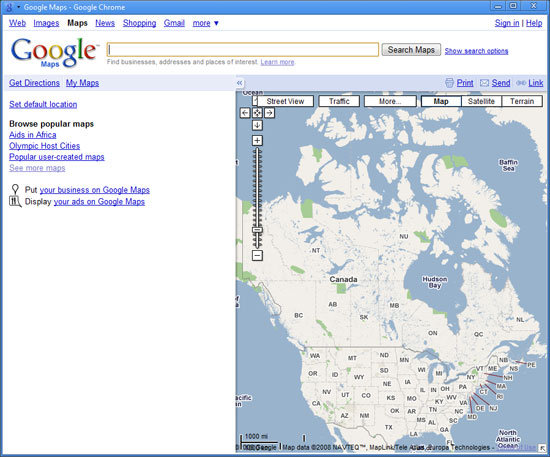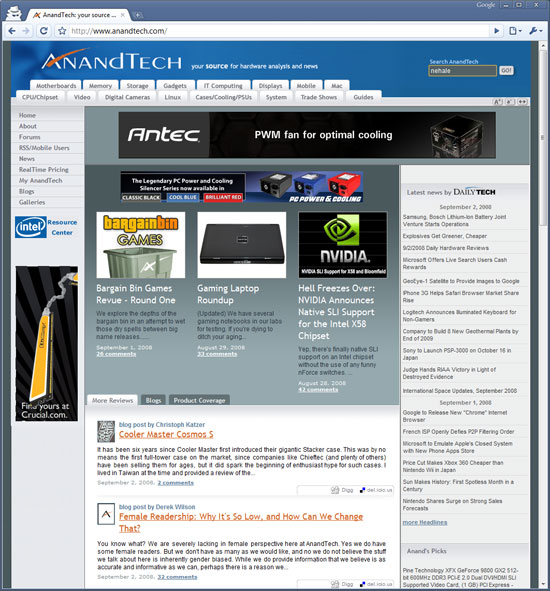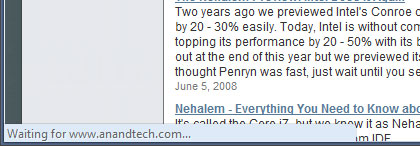Google Chrome: Performance and First Impressions
by Anand Lal Shimpi on September 3, 2008 12:00 AM EST- Posted in
- Software
Google made a...browser?
Based on WebKit, the same foundation for Apple’s Safari web browser - yesterday Google introduced Chrome, it’s own browser:

It’s been a while since we’ve had a brand new, completely unexpected Google launch and what better way to change that than by launching a damn web browser?
![]()
It's getting crowded in the browser market
Despite how often Google is viewed as competing with Microsoft, these days it’s acting very Apple-like. Android has the potential to bring to the masses much of what Apple did with the iPhone, and Apple’s MobileMe (albeit mismanaged and poorly launched) is one step away from being a costly Google Apps competitor. The browser step for Google is an interesting one, yet of all of the browser companies Google is the most natural fit - it’s almost surprising that Google hadn’t released a browser by now.
What follows are my thoughts on Chrome - be sure to chime in with your own in the comments.
Sometimes It Takes a Revolution
Google revamped a few basic things with Chrome, some of them with very deep implications.

Your home page is now a tiled list of your most visited websites. In the old days it used to be one site or one search engine, but now with sites like YouTube, Facebook, AnandTech (see how I snuck that one in there?), MySpace, Digg, etc... it’s tough to have just one single home page. Google’s change here makes sense and it is also quite altruistic. Google could’ve just as easily used its own browser platform to help promote its own websites and services.
If you’ve only got IE7 installed on your machine Chrome will even default to Microsoft’s Live Search as the default search engine, asking you if you’d like to change it. The assumption is that your computer is setup the way you want it to be and Google isn’t going to force its services on you - competition is best done based on merit, not by manipulating the market.

You can add direct links to web applications on your desktop, which will fire up Chrome in more of a thick-client view like this
The most visible change is that the tabs are now the topmost part of the browser window, in fact there’s no menu bar at all. Accessing typical menu items is done via two very simple buttons at the right of the OmniBar (what Google’s developers call the URL bar). There’s not even a menu item for opening a file/web page, although CTRL + O will bring up an open dialog box.
Removing the menu bar does something very interesting for Google Chrome: it makes it look very OS agnostic. It doesn’t quite fit in with Vista’s look and feel, nor does it look very Apple at all. In Google’s world, the OS doesn’t matter, so long as it has access to the Internet (see: Google docs, YouTube, Gmail, etc...). Given this view of the world, why should Chrome have an archaic remnant of conventional OSes? The missing menu bar is a very important statement.
There’s no search box in Chrome (not even a Google Search box), all searching/navigating is done through the OmniBar. Much like Spotlight under OS X, you get full text search through any webpage in your history. Remember reading something about panda bears a couple of days ago but can’t remember what site it was on? Just type in panda bears into the OmniBar and you’ll get a list of relevant results from your history.

Sites like Amazon can be searched from within the OmniBar as well, assuming you’ve performed a search on the site before. Just start typing Amazon into the OmniBar and hit tab to type in your search query. It’ll take you straight to the search results on Amazon.com. Pretty cool.
Incognito mode
Private browsing is taken the next level by Chrome with its incognito mode. You can choose to open an individual window/tab in incognito mode, where no data is logged and nothing is added to your history. You even get a cool guy wearing a trench coat in the upper left hand corner of your incognito window to drive the feature home.

Downloads & History
Downloads are handled quite elegantly in Chrome, when something starts downloading it appears as an icon at the bottom of your browser window. There’s no external download manager window. I’m not sure if this is the most efficient approach, especially when managing tons of downloads, but I suspect that it works well for most users.

Downloads appear at the bottom of your browser

The status bar only appears when appropriate, otherwise it disappears - even when visible it only takes up as much space as it needs.
History is organized like a simple web page, it just makes sense:











105 Comments
View All Comments
Griswold - Thursday, September 4, 2008 - link
I think they will be more mad about praising the first feature (tiled favourite websites on an empty tab) without mentioning, that google took this idea from Opera.Actually, there isnt much in terms of usability google didnt pick up from one of the other browsers... so much for innovation. That might end up just being under the hood, if they can deliver... but for now, we're looking at a year of "beta" tag next to the name, I betcha.
StormyParis - Wednesday, September 3, 2008 - link
Indeed, I am disappointed that my current (and still favorite) browser is not tested alognside the other ones. I'd love to know how it stacks up.I also have a couple of issues with the review:
- RAM usage goes up after opening then closing 3 tabs. So " when you’re done with a tab - close it and you get all your memory back right away." seems inaccurate.
- No credit given to Opera for the "Home page" feature, which it premiered.
- Lack of mouse gestures (which I use all the time, and are my main "positive" reason for still using opera) not mentionned, just un the comments.
As far as Chrome is concerned, I cannot use it due to its license: I do NOT (and I know of nobody who does) own the rights to everything I display or input in my browser.
Anubis - Wednesday, September 3, 2008 - link
yes we are very angry :(but seriously it should have been tested in this as well
DanD85 - Thursday, September 4, 2008 - link
Yay, me too, why no love for Opera as it's my main browser now. Although it did crash quite a lot on my HP dv2608tu Vista but I love the interface, the trash button if only they can improve the stability. And it's boot much faster than Firefox 3.01.SilverMirage - Wednesday, September 3, 2008 - link
I'm usin' Opera as we speak. I wish google would try adding mouse gestures. They aren't hard to learn and they are amazingly useful!It seems like many browsers are stealing Opera-like ideas...
npoe1 - Wednesday, September 3, 2008 - link
I think that Opera is the best browser by far.Justin Case - Wednesday, September 3, 2008 - link
Pretty much everything this review mentions as a "change introduced by Google" is simply copied from Opera. As were pretty much all browser features introduced in the past 8 or 10 years, come to think of it.exploderator - Friday, September 5, 2008 - link
Hmmm. Tabbed browsing, etc. Why even bother listing all. I agree, Opera have been top-tier pioneers in browser innovation. I am using it too, now, and 99% of the time. Have been for years. Tried FF a few versions back, but got tired of foreverever updating extensions, just to make it work like Opera. Now if they made Opera pertable ... oh wait ... Joy!R4F43LZiN - Saturday, September 6, 2008 - link
I've tried it. And alredy unistalled it. Opera still kicks some serious ass! And the G guys copied almost all the good features from Opera for this Chrome thing. Like the "Most visited sites" that everyone is talking about: its Opera speed dial, for ages.I mean, c'mon... And where is Opera in this "review"?
devolutionist - Wednesday, September 3, 2008 - link
yes, not pleased at all. but we're used to getting no love.